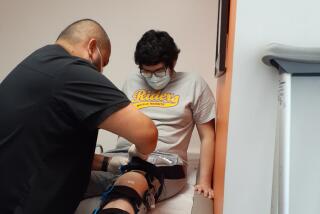Trainers Help Navigate the Fitness Maze
- Share via
Personal trainers, once a symbol of Hollywood success and the pampered rich, have gone grass-roots. As “working out” becomes a lifelong mantra, and the array of fitness equipment grows more complex, the personal trainer is increasingly seen as a necessity, not a perk.
“A trainer knows how to do the exercise correctly,” Beverly Hills chiropractor Dan Jacobsen says. “Not a week goes by that we don’t get somebody injured at the gym. You can wreck your back just by putting the weights down improperly.”
As personalized training has caught on with the common folk, the number of people who call themselves trainers has soared. One organization for health and fitness professionals, IDEA in San Diego, had only a handful of personal trainers as members seven years ago. It now has about 8,000, said David Gilroy, the group’s director.
Besides helping people set up a home gym and develop an individual exercise plan, personal trainers serve as motivators when self-discipline falters.
While some people need a trainer only to get a program of exercise and nutrition established, others want an ongoing relationship and are willing to pay for it.
“If you want somebody good, and you want them to come to your home,” expect to pay at least $50 an hour, said Gina Lombardi of Los Angeles, a longtime personal trainer. At a health club, personal trainers typically charge $35 to $75 an hour.
What should you look for in a trainer?
First, look for a personality match. Do you respond best to drill-sergeant tactics, or do you prefer a kindler, gentler approach?
One of the first things a good trainer should do is to complete a basic medical information questionnaire. He or she will want to know your health goals and will administer a fitness test of body fat, weight, blood pressure, muscle strength, endurance and agility.
“That’s necessary to track the progress of a client,” Lombardi said.
Also expect the trainer to take your personal data and design a program with short-term and long-term goals, giving you a personalized “distinct and clear action plan,” Lombardi said. To get the most for your money, look for a trainer with a college degree in a health science field or accreditation from a reputable organization.
“Just about anybody can put a shingle on their door--there are dozens of mail-order certification programs, and many aren’t any good,” Lombardi said. She helped develop accreditation standards for personal trainers for the National Strength and Conditioning Assn., based in Colorado.
Other reliable organizations, she said, include the American College of Sports Medicine, American Council on Exercise and National Council on Exercise.
“The typical person probably expends more effort finding a mechanic to fix their car than they do finding a personal trainer to help fix their body,” said Thomas Baechle, director of the NSCA certification commission.
“The new resistance machines are really exciting, and a trainer can maximize the potential of each repetition, so it’s a good investment,” he said.
On the other hand, working on the wrong machine could do more damage than good, said Baechle, author of “Weight Training Steps to Success” (Human Kinetics Publishing, 1998).
“Writing the book, I realized the number of variables--the grip, the stance, the body position, the belt--could be as much as 12. So with 10 machines, that’s 150 variables that need to be correct. That’s where a trainer can help.”
What to Ask Your Personal Trainer
To make sure you get a trainer who will help and not hinder, here’s a checklist for interviewing a trainer:
* Where did you get your education?
* Have you been a personal trainer for at least a year?
* Are you a member of a nationally recognized professional organization associated with fitness or wellness?
* Have you published fitness articles in a nationally distributed publication?
* What types of populations have you worked with--young, old, athletes, first-time exerciser, injured, pregnant?
* Do you have references from people with whom you’ve worked?
* What’s your fitness philosophy? What kind of workouts do you personally prefer?
* Do you have expertise in the type of equipment I will use?
* Would you let me observe while you work with other clients?


